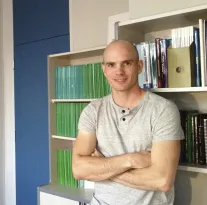Information Theory, Streaming and High-Frequency FX Trading
Dr. Roy Timo
Lehrstuhl für Nachrichtentechnik
Technische Universität München
Abstract:
There has been a recent and significant shift to algorithmic trading in finance markets. Many trades are now executed without any human intervention, and it is estimated that algorithmic trading now accounts for somewhere between 50% and 80% of the total dollar trading volume in the US.
The move to algorithmic trading presents new and interesting problems for coding and information theory. As a first step, we discuss a streaming problem that is motivated by the Foreign-Exchange (FX) market. We first introduce a source model for FX prices, and then formulate the streaming problem using an autoregressive-distortion function and a discrete memoryless channel. We present some achievable performance bounds, and discuss potential methods of finding converses. Finally, we conclude by comparing the streaming model to the anytime-coding literature.
Biography:
Roy Timo is an Alexander von Humboldt postdoctoral research fellow with the Institute for Communications Engineering at the Technische Universität München (TUM). Prior to joining TUM, he was a research fellow with the Institute for Telecommunications Research at the University of South Australia and a postdoctoral researcher with the Communications and Electronics Department at Telecom ParisTech. He was also a Visiting Postdoctoral Research Associate with the Department of Electrical Engineering at Princeton University.
Dr. Timo received the Bachelor of Engineering (Hons.) degree from The Australian National University (ANU) in July 2005, and the Ph.D. degree in Engineering from The ANU in December 2009. He was a NICTA-enhanced ANU Ph.D. candidate at NICTA’s Canberra Research Laboratory. He received the best student paper awards at the 2007 Australian Communications Theory Workshop (AusCTW) and the 2007 IEEE Australasian Telecommunications Networking and Applications Conference (ATNAC). He is a member of the IEEE Information Theory Society.
